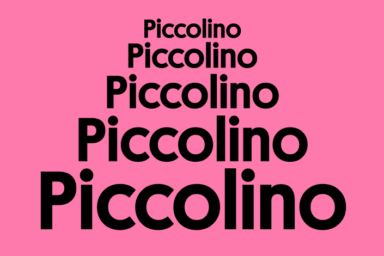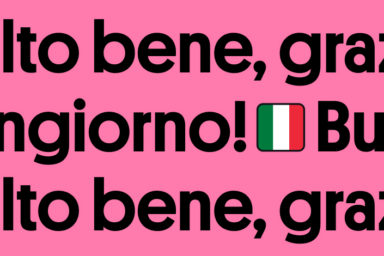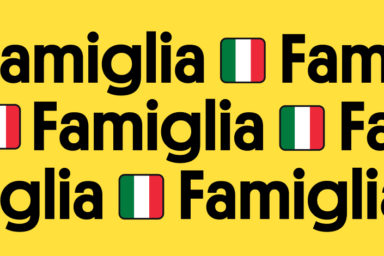Exploring the rich world of Italian slang

- Popular Italian slang expressions
- The most popular Italian slang words and phrases
- Types of Italian slang
- Regional variations in slang
- Generational slang: How Gen Z talks
- Profane vs. playful expressions
- How to speak like a local: Tips for embracing Italian slang
Did you know that Italy, the land of art, culture, and exquisite cuisine, is also home to a vibrant world of slang? From the bustling streets of Rome to the charming villages of Sicily, Italian slang adds a unique layer of flavor to the language.
If you want to connect with locals, understand Italian culture on a deeper level, or navigate the informal side of the language, this article is your passport to the fascinating world of Italian slang.
We’ll dive into some popular Italian slang words and expressions, explore the various types of Italian slang, learn how to speak like a local, and discover the role of slang in business and formal settings.
So, let’s get going!
Popular Italian slang expressions
When it comes to learning a language, using slang words and phrases is crucial to sounding more like a local. Exploring Italian slang, therefore, is like discovering a secret code to help you connect with Italian people and take a peek into their daily life. From friendly greetings to cool sayings, these (sometimes) fun expressions will help you fit in and embrace Italian culture.
The most popular Italian slang words and phrases
Italians have a very colorful language and are fearless in using it in the most diverse contexts.
Whether with family, among friends, in the workplace, on transportation, or in public offices, there will be no shortage of opportunities to hear the colorful expressions that make Italian a truly creative language.
Here are some of the most popular expressions and what they mean:
| Italian | When is it used? | English meaning |
| Basta! | This is used to enjoin silence or to force someone to stop what they are doing. |
Enough! Stop! That’s it! |
| Boh | It’s often employed when someone is uncertain, doesn’t know the answer, or is expressing a lack of interest or indifference. It’s somewhat equivalent to “I don’t know,” “Who knows,” or “Whatever” in various contexts. |
Dunno Who knows! |
| Cavolo!
|
Cavolo means “cabbage,” but it is also used to talk about something of little value or to say that something will never happen. |
Geez!
|
| Che casino! | This exclamation is used when someone is faced with a complicated situation. | What a mess/chaos! |
| Che culo! | Culo is the vulgar version of sedere, meaning “butt.” If you “have culo,” you are a lucky person. Be careful to use it only in specific contexts and with people you know well; otherwise, it might sound like a sexist and offensive comment. | Lucky you! |
| Che palle | This is used when a situation is disappointing or boring. Palle is the vulgar synonym for “testicles.” |
That sucks What a pain in the ass |
| Che sfiga! | This phrase expresses regret in the face of an unfortunate event. |
Bummer That sucks! |
| Ciao! | Not just a standard greeting, this is an informal way to say “hello” and “goodbye.” |
Hello! Bye! Goodbye! |
| Dai! | This is used as a way to give encouragement or show exasperation. |
Come on! Let’s go! |
| Fare casino | Casino means “brothel,” but figuratively, it describes a noisy or confusing situation. |
Make a mess Make a fuss Mess around |
|
Fico Che fico! |
This is an expression of wonder or excitement at something cool. |
Cool! Awesome! |
| Figurati! | It is used to express various sentiments, such as gratitude, reassurance, even humility or apology, depending on the context. |
Imagine! No problem! Don’t mention it |
| In bocca al lupo! | This literally means “in the mouth of the wolf,” but it is used as a way to wish someone luck. |
Best of luck! Break a leg! |
| Magari | This expresses a vivid desire that feels unattainable. | Maybe If only I wish |
| Mangia! | You will hear this term most often at the dinner table, especially in families where a mother or grandmother invites you to finish all the food on your plate. | Eat! |
| Mannaggia | Use this as an exclamation for disappointment, anger, or objection. |
Damn Darn it |
| Me ne frego | This is a way to show disinterest or detachment from someone or something. | I don’t give a damn I don’t give a shit I don’t care |
| Mi raccomando | This phrase is used to give a recommendation or some advice to a person. It can be used affectionately or even as a warning, depending on the tone. |
Take care Be careful |
| Mi sa che… | This expresses doubt or introduces a statement that you are not sure of. |
I think… It seems like… |
| Non esiste! | This literally translates to “it does not exist” and is used to express disbelief or a refusal to do something. | No way! |
|
Prendere in giro
|
This is a figurative way of saying that someone does not take another person seriously. |
Teasing
|
| Prendere una sbronza | Sbronza refers to a state of drunkenness or intoxication resulting from alcohol consumption. It’s a colloquial and informal term and is equivalent to “drunk” or “intoxicated” in English. | Take a bender |
| Sfigato/sfigata | This is an adjective used as a derogatory word for an uncool person. | Loser |
|
Tranquillo/a Tranqui |
Tranquillo means “quiet”, “calm”. It’s common to use this adjective to express consolation or encouragement. In a very conversational context, you can use the shortened form, tranqui. | Don’t worry |
| Un botto
Un sacco Una cifra |
These are three expressions indicating a large but indefinite quantity. | A lot |
Types of Italian slang
Italian slang is like a vibrant mosaic made up of different pieces of language, culture, and generational trends. It’s not just about words; it’s a world of expressions showing how the Italian language and society evolved. In this section, we will explore the different types of Italian slang.
Regional variations in slang
Italian slang isn’t uniform across the country; each region boasts unique expressions. From the Venetian dialect in the North to the Neapolitan dialect in the South, understanding regional slang can be a delightful adventure.
For example, Bella lì is an exclamation that uses one of the most famous Italian words, bella. It means “beautiful there,” but in the Rome area, it is also used as a form of informal greeting or to express appreciation.
- Example:
Ehi, ho portato le birre! (“Hey, I brought the beers!”)
Bella lì! (“Cool!”)
Generational slang: How Gen Z talks
Age differences also influence Italian slang. What may be trendy and hip for younger generations might sound outdated or unfamiliar to older Italians.
Generational slang changes very quickly and is much influenced by the cultural phenomena of the moment (often from outside Italy). According to a survey of 1,647 people living in Italy conducted by Preply in spring 2023, these are the most common words in Italian Gen Z slang:
| Italian | Meaning |
| Amo | A friendly and affectionate nickname short for amore (“love”) |
| Bro | Abbreviation of the English “brother” used as a way to address peers |
| Che sbatti | Used to say that you don’t feel like doing something |
| Inciucio | Often used to speak of an unclear agreement reached through compromise, especially in the political area. But it can also indicate a vague romantic relationship with unclear boundaries. |
| Instagrammabile | Adjective to describe content (photographs, images, videos, etc.) that is suitable for sharing on Instagram, conforming to social media aesthetics |
| Mai una gioia | An expression of discouragement in the face of yet another disappointment in life |
| Postare | To publish a post or comment on a social network or blog |
| Scialla | Said to reassure someone or let them know that there is no problem |
| Screenshottare | To take a picture, via a phone command, of what is displayed at a specific instant on the phone screen |
| Spoilerare | When you reveal parts of the plot or the ending of a TV series, movie, or novel |
As you can see, some expressions – such as postare, screenshottare, and spoilerare – are Italianizations of English verbs!
Profane vs. playful expressions
Italian slang covers a broad spectrum, from lighthearted, playful phrases to more explicit and, at times, offensive expressions. It’s essential to know where to draw the line and use slang appropriately in various contexts.
Let’s explore some profane Italian expressions that can be transformed into playful and non-offensive versions:
| Profanity | Playful alternative | Meaning |
| Cazzo! | Caspita!
Diamine! |
This conveys surprise or confusion. Cazzo is a common name for the penis, so it is better to replace it with caspita or diamine, which are typical expressions of surprise. |
| Che stronzo! | Che sciocco! | Stronzo is an insult that means “jerk” or “asshole.” For a playful and less offensive term, you can use sciocco, which means “silly” or “goofy.” It’s a way to tease someone without resorting to profanity. |
| Merda! | Mannaggia! | Merda means “shit” and is considered vulgar and impolite. To express mild frustration without using profanity, you can say mannaggia, a milder exclamation conveying annoyance without offending. |
| Porco zio | Porco mondo | Combining porco (“pig”) with zio (“uncle”), this phrase is impolite and offensive. In this context, zio is also used as a mispronunciation of a similarly sounding word, dio (“God”), which turns the exclamation into a blasphemy. For a playful expression without the offensive reference to family, you can say Porco mondo! (“Pig world!”) to convey frustration or disappointment in a lighthearted manner. |
| Testa di cazzo | Testa di rapa | This profane expression translates to “dickhead” and is highly offensive. To maintain a playful tone, you can say testa di rapa, which translates to “turnip head.” It’s an easygoing way to criticize someone’s behavior. |
| Vaffanculo | Vai a quel paese | Vaffanculo is one of the strongest and most popular Italian profanities, equivalent to “go f*** yourself.” Vai a quel paese is a more acceptable alternative that means “go to that town,” expressing mild irritation or annoyance. |
How to speak like a local: Tips for embracing Italian slang
Embracing Italian slang requires some finesse because it is about incorporating it into your conversations without it sounding forced or out of place.
To sound like a local, consider the following tips:
Listen and observe
One of the best ways to learn Italian slang is by listening to native speakers in everyday situations. Pay attention to how they use it in casual conversations, movies, TV shows, podcasts, or social media posts. This will help you grasp the appropriate context for different expressions.
Choose slang that fits your persona
Italian slang varies in intensity, from lighthearted to more explicit. Select words and phrases that align with your personality and the situation. Opt for fun and harmless slang if you’re naturally playful and cheerful. If you’re in a relaxed, informal setting, using milder expressions can be more appropriate.
Practice with native speakers
Engaging in conversations with native Italian speakers is invaluable. They can provide feedback, correct pronunciation, and guide you on when to use slang effectively. Consider language immersion experiences or taking Italian lessons online with a Preply tutor – a great way to have honest, topical conversations with locals.
Start slowly
If you’re new to Italian slang, don’t overwhelm yourself by using too much too soon. Begin by incorporating one or two expressions into your conversations and gradually expand your repertoire as you become more comfortable.
Match the slang to your audience
Be mindful of your audience when using slang. It can be great for informal chats with friends or peers, but it might only suit some situations. Opt for standard Italian to maintain respect and decorum in formal or professional settings.
Understand regional differences
Italian slang varies not only between generations but also by region. Take the time to learn and understand the local slang if you’re in a specific region of Italy, as it can differ significantly from one place to another.
Be playful and confident
Part of the charm of using slang is the playful and confident delivery. Feel free to have fun with it! Experiment, make mistakes, and embrace the learning process.
Examples:
- Imagine you’re with friends at a café in Rome, and someone asks how you’re feeling today. Instead of using the standard Sto bene (“I’m fine”), you could respond with a playful Sto alla grande! (“I’m doing great!”), adding a touch of enthusiasm to your conversation.
- If you’re chatting with a friend about weekend plans and they invite you to a party, you can respond with a laid-back Chiaro! (“Sure!”) to show your eagerness to join the fun.
- In a casual conversation, you might express surprise by exclaiming Mamma mia! instead of the more formal Oh, mio Dio! (“Oh, my God!”). Both convey surprise, but the former adds a local flavor to your expression.

Slang in business and formal settings
Language often takes on a more structured and professional tone in business and formal settings. As surprising as it may seem, a touch of slang can uniquely influence professional relationships, as you shall see next.
How slang can influence professional relationships
Incorporating slang into formal conversations can, somewhat paradoxically, humanize interactions and foster a sense of camaraderie. When used sparingly and wisely, it can break down barriers and create a more relaxed atmosphere, helping colleagues and business associates feel more comfortable in your presence. Slang can also make you appear approachable and relatable.
During a formal business meeting, using a phrase like Chiudiamo il cerchio (“Let’s close the loop”) can infuse energy into the discussion and encourage collaboration. This casual approach can lead to more productive exchanges, as it promotes a sense of unity and shared purpose.
Tips on using slang in workplace conversations
The key to effectively using slang in professional settings is knowing when and how to use it without crossing boundaries. Here are some guidelines for its appropriate usage:
Understand the environment
Take the time to understand the workplace environment before incorporating slang. Some organizations and industries may be more open to informal language, while others may have a stricter, more traditional approach.
Use slang sparingly
Limit your use of slang to occasional and appropriate moments. Reserve it for situations where it can add value to the conversation without undermining professionalism.
Know your audience
Be aware of who you’re talking to and their comfort level with informal language. If you’re unsure, it’s safer to lean toward formality until you gauge their receptiveness.
Match slang to the context
Choose slang expressions that align with the context of the conversation. Lighthearted slang is acceptable when discussing a relaxed team-building event. However, maintaining a formal tone is typically more appropriate in a high-stakes negotiation.
Balancing slang with formality
Balancing slang with formal language is a skill that can help you stand out positively in both professional and social scenarios. Here are some practical sentences in Italian that strike a balance between slang and formality:
During a team meeting
- Formal:
Propongo di discutere gli obiettivi trimestrali e formulare strategie per raggiungerli.
“I propose to discuss quarterly goals and formulate strategies to achieve them.”
- Informal:
Diamo un’occhiata agli obiettivi del terzo trimestre e cerchiamo di sfondare!
“Let’s take a look at the third quarter goals and try to break through!”
Email to a colleague
- Formal:
Le scrivo per chiedere il suo aiuto con il prossimo progetto.
“I am writing to ask for your help with the next project.”
- Informal:
Ciao, hai un attimo per darmi una mano col prossimo progetto?
“Hi, do you have a moment to give me a hand with the next project?”
In a formal presentation
- Formal:
Ora procederò ad analizzare le tendenze di mercato e presentare i risultati.
“I will now proceed to analyze the market trends and present the results.”
- Informal:
Adesso, immergiamoci nelle tendenze di mercato e diamo un’occhiata a cosa abbiamo scoperto.
“Now, let’s dive into market trends and take a look at what we have found.”
In a conference call
- Formal:
Vorrei sollevare una questione critica che richiede immediata attenzione.
“I would like to raise a critical issue that needs immediate attention.”
- Informal:
C’è una questione urgente da affrontare subito.
“There is an urgent issue that needs to be addressed immediately.”
During a job interview
- Formal:
Ho un’ampia esperienza in gestione progetti e un track record di obiettivi raggiunti.
“I have extensive experience in project management and a track record of achieving goals.”
- Informal:
Gestisco progetti da una vita e ho un buon fiuto per centrare gli obiettivi.
“I have been managing projects all my life and have a good nose for hitting targets.”
In a customer service interaction
- Formal:
Mi scuso per eventuali disagi che potrebbe aver subito, e lavoreremo per risolverli prontamente.
“I apologize for any inconvenience you may have experienced, and we will work to resolve it promptly.”
- Informal:
Mi dispiace per il fastidio. Siamo al lavoro e risolveremo in fretta.
“I am sorry for the inconvenience. We are hard at work and will solve it quickly.”
In a thank-you note to a supervisor
- Formal:
Apprezzo la sua guida e il suo supporto durante il mio periodo qui.
“I appreciate your guidance and support during my time here.”
- Informal:
Grazie per essere stato un mentore fantastico durante il mio tempo qui. Il tuo supporto significa molto!
“Thank you for being an amazing mentor during my time here. Your support means a lot!”
In a networking event
- Formal:
Mi interessa esplorare opportunità di collaborazione potenziale.
“I am interested in exploring potential collaboration opportunities.”
- Informal:
Sono qui per fare due chiacchiere e vedere se c’è modo di fare qualcosa di interessante insieme.
“I’m here to have a chat and see if there is a way to do something interesting together.”

Conclusion
Italian slang adds depth and character to the language, allowing you to connect with locals more personally. By mastering it, you’ll enrich your vocabulary and gain insights into this magnificent country’s cultural nuances.
Preply offers a diverse range of experienced Italian tutors who can guide you through the intricacies of slang, help you expand your vocabulary, and give you a deeper understanding of Italian culture. With their support, you’ll be able to embrace the world of Italian slang, and you’ll find yourself navigating the language with finesse, wit, and charm.
Buon divertimento! (Have fun!)
FAQs
What is the difference between slang and dialect in Italy?
Are there slang words unique to certain Italian regions?
Can non-native speakers effectively use Italian slang?
Is it considered rude to use slang in formal Italian settings?
Next article

The ultimate guide to Italian numbers
Learning to count is an essential part of mastering Italian. We’ve created the ultimate guide to help you count into the thousands and get by in Italy.
Previous article

Italian terms of endearment: Discover the language of love
Discover the most heartwarming Italian terms of endearment, from romantic nicknames to adorable pet names. Share the language of Italian love with your loved ones.








